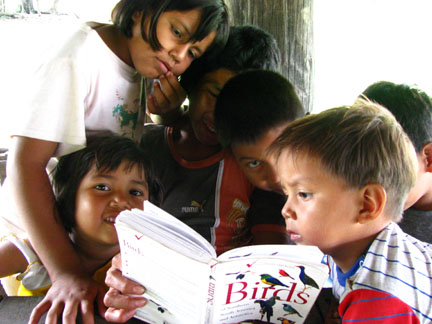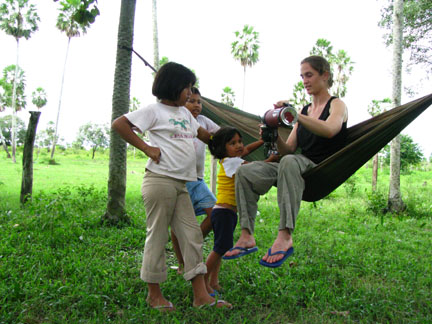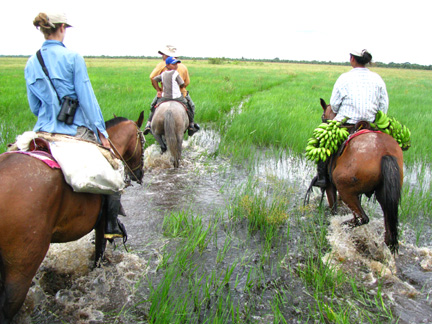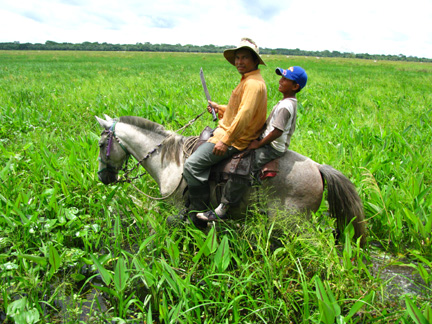Steve and I arrive at Encanta, where a nest has just been found: The pair of Blue-throated Macaws who lost their eggs earlier this season are now incubating two eggs. We are very excited to watch over this new nest and do all we can to ensure success for this pair on their second nesting attempt of the year.
January 21st
Yesterday Steve and I arrived at Encanta, an isolated estancia which will be our home for the remainder of our time with the project. Encanta is 5 km from Esperanza (the closest estancia which can be accessed by road), although with the current flooded condition, a 7-8 km roundabout route must be taken when traveling between to two estancias. Even the roundabout route has enough water that I had to lift my legs up, above the horse's back, when navigating the deeper parts. With another foot of water, the horses would have been swimming. Much of our path wove through the jungle, bordering the flooded wetlands (savannah in the dry season)-and even here, in the lush, dense forest there are several feet of standing water in most places, giving our journey a particularly adventurous feel. We spent much time flattened against our horses' necks to slip beneath low hanging branches. Steve was nearly hung from a tree by his backpack when the top of the pack hooked onto a branch and the horse panicked at the sudden resistance and tried to bolt. Then there was a hornet nest we had to run the horses away from and more branches to duck under and plenty palo diablo (a poisonous tree) to avoid brushing against.
.jpg)
Adult BTMs at Encanta
The jungle here is beautiful-very distinct from the forest islands of Tres Palmeras and the Campamento, about 250 km from here. I love the place and the family we're living with. Steve and I both feel lucky, getting to spend time here, at the isolated Encanta. The only other active nest (and the 2 other project employees) are at Esperanza, where the nest is so close to the house and the chicks so big that there is no quiet time in the forest and very little work.

The kids of Encanta looking at our bird book

Me serving mate to the kids from my hammock
Yesterday afternoon Steve and I set out to climb the Encanta nest tree, to assure ourselves of the status of the nest. Nine and ten-year-old Yusara and Rolando, the two oldest kids, tagged along to watch us climb the nest. Unfortunately this meant that the three dogs trotted along behind us as well. We were about 100 meters into the jungle when the dogs ran ahead, yipping and squealing and thrashing about in a way that I knew could only mean they were killing something. We ran to where they were gathered in a frenzy in time to see one of the dogs violently shaking a tiny, baby coati (tejón) as the mother and her other baby watch helplessly from a tree. I screamed at the dogs and kicked them, yelling "Fuera, fuera de aqui, perro basura" (Out, get out of here, bad dog). This incited riotous giggles from the children, for whom the killing scene was quite normal. "I hate it when dogs kill wild animals," I explained to them. "Because there are lots and lots of dogs in the world and very few tejón. If the dogs are always killing, killing, killing, someday there will be no more tejón."
The dogs were certainly shocked by my reaction and it took a few more hard kicks before they went back home. That is the last time I will let the dogs follow me into the forest. After successfully chasing away the dogs and taking a few photos of the distressed mother coati we continued to the nest tree, where the female BTM flew out of the box upon our arrival. Just as Steve began to climb the rain began-big fat drops that soaked us immediately and we had to abort the mission.
This morning we went again to the nest, this time without dogs or rain, and were very pleased to find that all is well in the nest box. I reached in and set two fingers gently over one of the warm eggs, trying to feel any movement within. How exciting it will be to see the tiny, newly hatched barba azul chicks and to look out for them during this most sensitive stage.
I am now sitting at the table in the open-air, grass-roofed kitchen and 4 of the 6 kids are watching me write while they eat/play with the guineo bananas that are tiny and very sweet-picked fresh from the chaco (Bolivian word for orchard or garden) about 1 km from here. In the chaco they grow guineo, corn, watermelon, squash, and yuca.


Above images: Riding back from the chaco with guineo and Senor Rolando with his son, also named Rolando
January 22nd
The road between Loreto and Trini is flooded and unusable until the dry season, despite Igor's assurances that the road stays dry year round, regardless of rain and flooding in surrounding areas. His assurances were based on the average rainy season here, assuming that last year’s flood would not make a re-appearance and wreck havok on the Beni yet again. Unfortunately it looks to be a big flood year again and Trini is filling with water and dengue fever-the radio made an announcement this morning, cautioning residents to keep their windows and doors closed to protect themselves from the potential upcoming epidemic. The classes in Trini, which are supposed to start on February 11, will be delayed, as they were last year, because when the outer neighborhoods of Trini flood, the people from the flooded houses move into the schools until the water goes down.
































